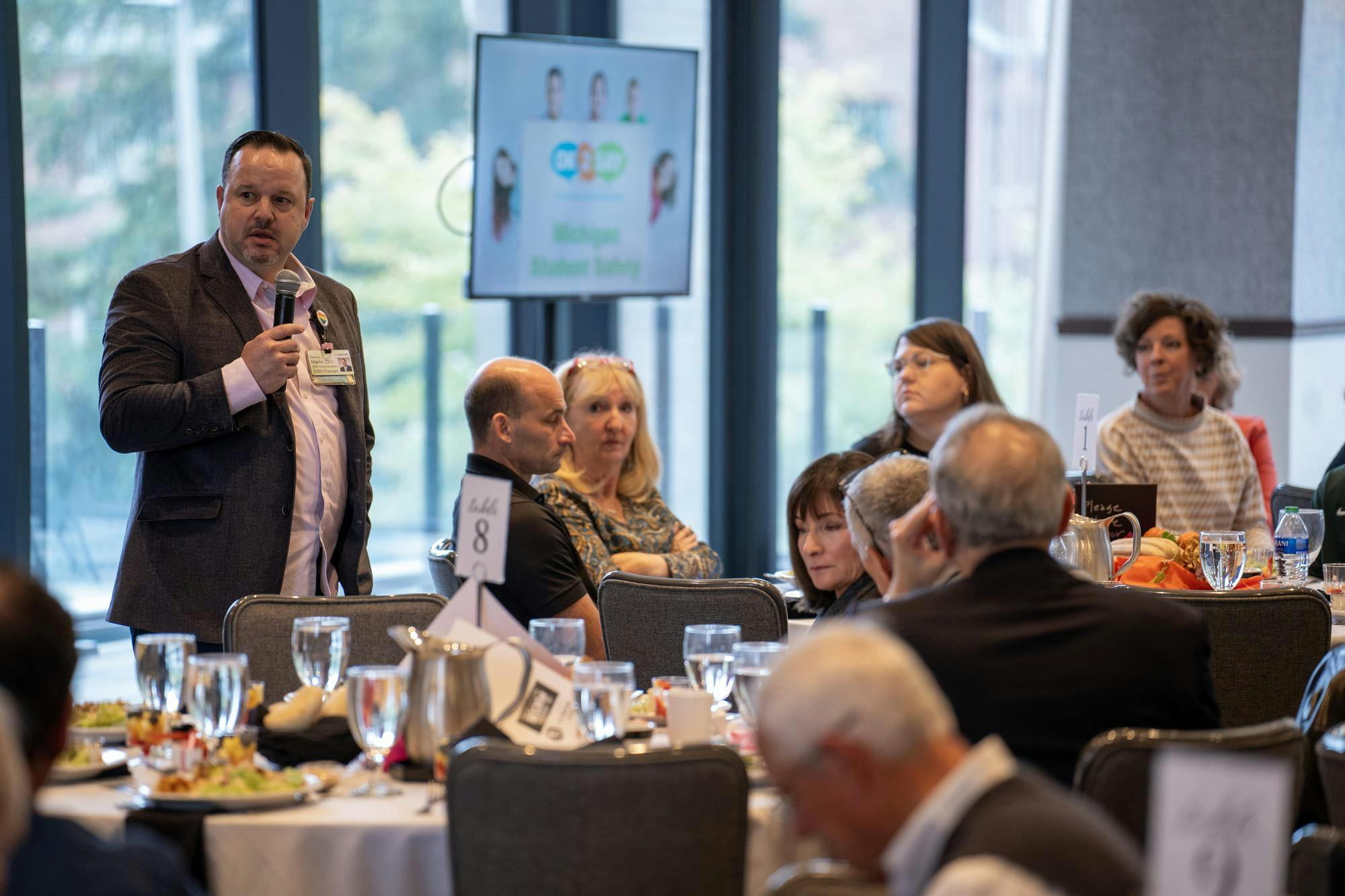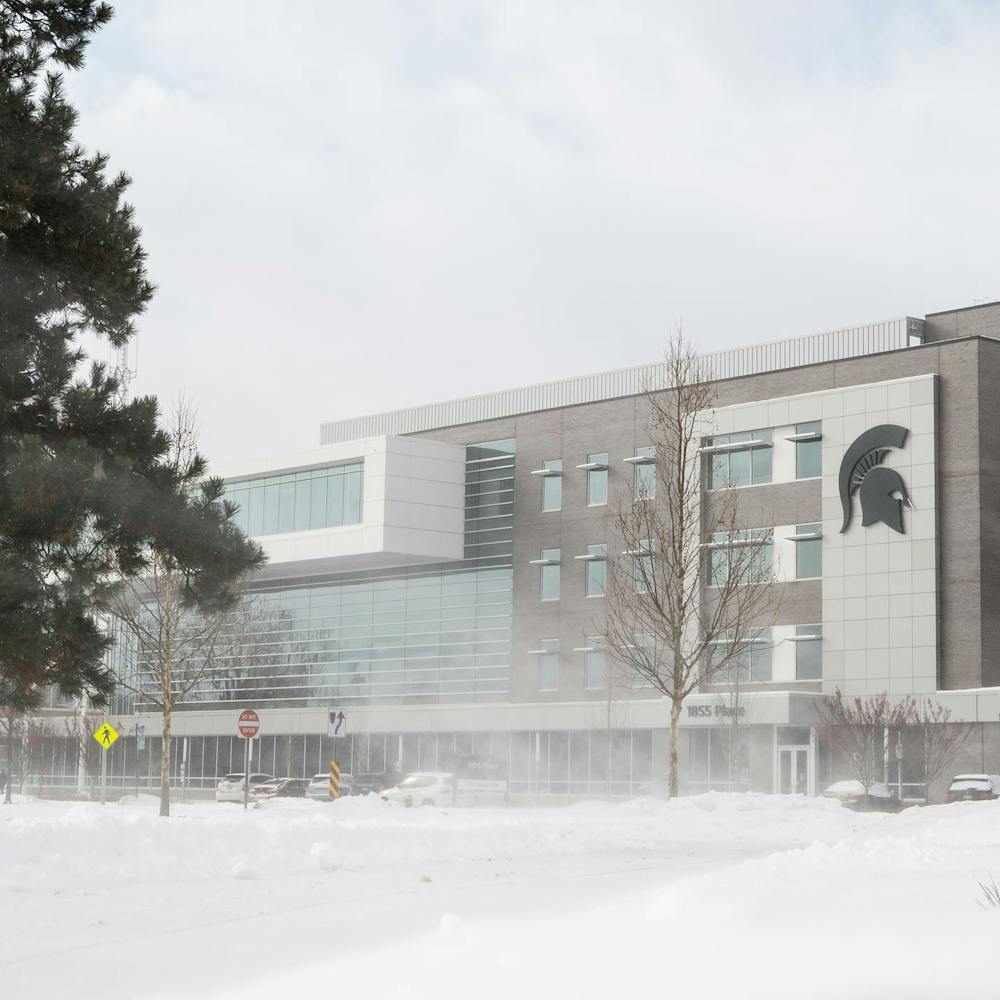Content warning: This article contains description of the Feb. 13 mass shooting that some may find upsetting.
The Michigan State Medical Society Alliance, or MSMSA, hosted its fifth annual Fall Focus Health Symposium Tuesday morning to highlight various voices who have been affected by gun violence in the MSU community.
The MSMSA is an organization of physician partners and spouses that coordinates philanthropic efforts to develop, support and implement statewide programming that will improve public health.
The event's first speaker was President of Sparrow Hospital Dr. Denny Martin who took immediate action on the night of Feb. 13 to treat, and ultimately save the lives of, the five students who were injured in the mass shooting on MSU campus that killed three students.
Around 8:20 p.m., Martin was in REO Town, a district of Lansing located about two miles away from Sparrow Hospital, when his director of public safety texted him and told him there was a mass shooting in progress on MSU’s campus.
“My first thought was to get to the hospital as fast as I can,” Martin said.
Upon arriving at the hospital, Martin and his team began clearing space in operating rooms.
“We immediately looked at our ER capacity and moved a lot of people to take in a rush of, at least, 20 patients into the hospital,” Martin said.
The next step was organizing teams to treat injured victims based on calls coming in from EMS communicating the condition of the victims and the nature of their wounds. Martin also made direct calls to specialist physicians including thoracic surgeons, neurosurgeons and vascular surgeons who were needed at the hospital to treat victims.
“We could tell early on that these were individuals that had truly life-threatening injuries, so they would all most likely need to go to the operating room for immediate stabilization,” Martin said.
“For me and the rest of the team, I think we went into (a mode of) ‘this is our business. This is why we’re a Level 1 trauma center, this is why we’re here for the community,'" Martin said.
Martin said that Sparrow Hospital’s procedures for responding to a mass shooting were fresh in the minds of himself and his team because his team had reviewed mass shooting response procedures just a week prior, after multiple Michigan high schools, including Okemos High School, came under a fake threat of a school shooting. The threat was an act of “swatting,” in which someone calls police to deceive them into going to a particular address.
“We put these processes in place, and we have these algorithms to really help us in what could be a very emotionally-charged event,” Martin said. “If we let our emotional decision making take over, that’s when we mess up and forget about things that we’re supposed to do.”
While Martin and his team were able to manage their emotions in order to deliver a swift, life-saving response the night of Feb. 13, Martin said there were still emotional impacts for himself and his colleagues.
Martin, who is currently working on his third degree from MSU, and has lived in the community for about 13 years, said that the shooting felt like an attack on his home.
“It was in the days afterwards that (I) really realized what we all went through,” Martin said. “From being sad and angry, to proud of the team and how we did. Everyday it was a different (emotion).”
Martin said he and his team grew close to the injured students they cared for in the weeks following the shooting.
“Some of the students didn’t have family close, so we took them in and adopted them,” Martin said. “It was good to get to know those people, and they did become part of our family.”
Martin, who received national attention for his emotionally-charged response at a press briefing the morning after the shooting, emphasized the ongoing mental health impacts for healthcare workers who deal with traumatic events such as the Feb. 13 mass shooting.
“We provide the care, but we need the care just as much as everybody else does,” Martin said.
Martin also spoke on the mental health impacts for MSU students who are still living with the trauma from that night and the physiological effects that a traumatic event can have on an individual.
“Our bodies’ response to a stressful event is very real," Martin said. "It impacts sleeping, it impacts our metabolism, it impacts our ability to focus.”
One MSU student who has experienced the physiological toll of the shooting is Stephen Izzo, an MSU basketball player and son of basketball coach, Tom Izzo.
During his remarks at the event, Izzo said “for months, when I would sleep, I could hear sirens. It was constant. My ears were ringing, but it only sounded like police sirens.”
Izzo recalled his experience on the night of Feb. 13.
Izzo was driving on M.A.C. Avenue on the way to pick up his girlfriend from her class at the Human Ecology Building when multiple police cars sped past him. Izzo, concerned and confused about what was happening, turned down Grand River Avenue, and then on to Abbot Road, before turning into the roundabout in front of the west entrance of the Union.
There, he heard a group of students yell something about a gun before taking off running. Izzo rolled down his window and asked a police officer what to do. The officer told him there was an active shooter and to drive away.
Sandwiched between parked police cars, Izzo pulled off onto the sidewalk before driving to Kedzie Hall where he called his mom and waited for fleeing students that he could drive to safety. He eventually received an alert and drove to the Breslin Center where he remained until the morning.
Izzo’s girlfriend was barricaded in a bathroom in the Human Ecology Building with 70 other classmates while the "Run, Hide, Fight" order was in place. She was eventually driven back to her dorm by a classmate and then picked up and taken to her parents' house by Izzo.
“(MSU) has been safe for me for 23 years, and a couple days, and a couple bad nights don’t really make this place the worst,” Izzo said. “It’s tough that other people have bad memories of this campus and this university.”
Other speakers at the event included Oakland County Emergency Responder, Adam Kammer, who was on the scene at MSU on the night of Feb. 13 and at the 2021 Oxford shooting.
Kammer, who dedicates much of his time to active shooter training for civilians, emphasized the importance of civilian preparedness in reducing the number of casualties in active shooter situations.
“The first time your brain is processing what you would do if something happens—don’t let it be when the real-life event happens,” Kammer said.
As the community works to heal from the events of Feb. 13 and makes efforts to curb the impacts of gun violence going forward, Martin spoke of the sobering reality of MSU students having to navigate college life under such difficult circumstances.
“Individuals, whether you’re in kindergarten or college, you shouldn’t have to worry about this kind of event while you’re just trying to learn and get on the road for the rest of your life and start a career,” Martin said.







